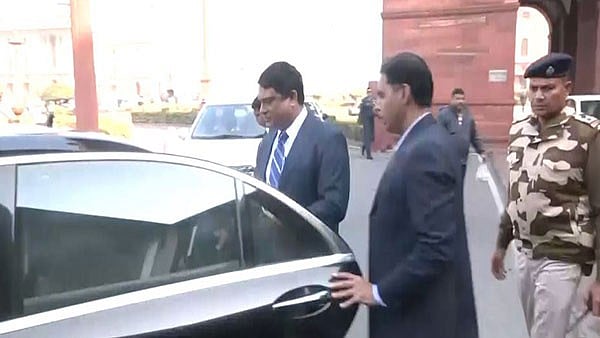
Mohammed Nurul Islam, Bangladesh’s deputy high commissioner to India.
Credit: ANI screengrab
New Delhi: Dhaka’s deputy envoy to New Delhi was on Monday summoned to the headquarters of the Ministry of External Affairs (MEA), where senior diplomats conveyed to him India’s expectation for Bangladesh to adopt “a cooperative approach” in combating cross-border crimes.
New Delhi dismissed Dhaka’s allegation that India’s Border Security Force had violated bilateral agreements while trying to erect barbed wire fences in some locations along its border with Bangladesh, resulting in escalating tension in the border areas.
“It was conveyed that with regard to security measures at the border, including on fencing, India observed all protocols and agreements between the two governments and between the Border Security Force and Border Guard Bangladesh (the border guarding forces of India and Bangladesh respectively),” the Ministry of External Affairs stated after Dhaka’s deputy envoy to New Delhi was summoned to the South Block.
The summoning of Mohammed Nurul Islam, Bangladesh’s deputy high commissioner to India, to the MEA headquarters was a tit-for-tat response by New Delhi to a similar move by Dhaka on Sunday.
Bangladesh’s Foreign Secretary Md Jashim Uddin summoned Pranay Kumar Verma, New Delhi’s envoy to Dhaka, and conveyed to him the deep concern of the interim government led by economist Muhammad Yunus in the neighbouring country over the “unauthorised attempt” by the BSF to construct barbed wire fencing along the border, stating that such actions had caused tensions and disturbances along the border.
Jashim Uddin also conveyed to Verma the concerns of Dhaka over the recent killing of a citizen of Bangladesh along the border by the BSF soldiers of India.
New Delhi conveyed to Dhaka that the BSF had opened fire on a group of smugglers, who were crossing over from Bangladesh to India, and this resulted in the death of a man, who was illegally bringing in betel nuts from across the border.
“India reiterated its commitment to ensuring a crime-free border by effectively addressing the challenges of cross-border criminal activities, smuggling, movement of criminals and trafficking. Barbed wire fencing, border lighting, installation of technical devices and cattle fences are measures for securing the border,” the MEA stated in the press release issued after its senior officials had a meeting with Dhaka’s deputy envoy to New Delhi.
India conveyed its expectation that all earlier understandings on issues related to the boundary between the two nations would be implemented by Bangladesh.
The relations between New Delhi and the interim government led by economist Muhammad Yunus in Dhaka came under stress over the past few months with India expressing concern over the persecution of the Hindus and other minority communities in Bangladesh after the fall of the Awami League government led by Sheikh Hasina in the neighbouring country on August 5 last year.
Hasina flew from Dhaka to an Indian Air Force base on the outskirts of New Delhi on August 5. Her continued stay in New Delhi has been another contentious issue between India and Bangladesh. Dhaka sought her extradition from India to Bangladesh, but New Delhi has not yet responded to the request. Dhaka’s protest over the BSF’s move to build fences on certain locations along the border between India and Bangladesh has emerged as the latest irritant in ties with New Delhi.
